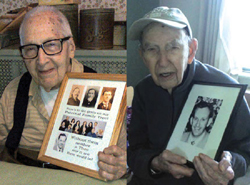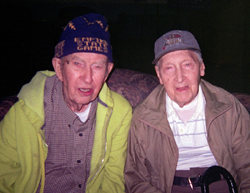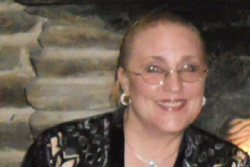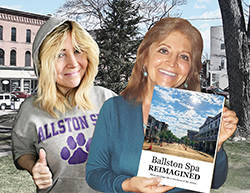Legacies Unlimited is committed to preserving the past and present for future generations. In addition to sharing memories that might otherwise be forever lost, we document “history in the making” by celebrating contemporary lives that add strong and vibrant threads to the rich tapestry of our nation’s heritage.
Donald Roy Hauprich, Sr.
A long lost cousin is found...
at long last!
(Click
here for expanded
PDF
version.)
By Ann Hauprich
 Although
I didn’t meet the relative who shared my father’s first and last names until
2014, I soon came to feel as if I’d known him since he was a knicker-clad lad in
the early 1930s.
Although
I didn’t meet the relative who shared my father’s first and last names until
2014, I soon came to feel as if I’d known him since he was a knicker-clad lad in
the early 1930s.Sure I’d overheard references to the existence of “The OTHER Donald Hauprich” over the decades. But mentions were fleeting and a veil of secrecy otherwise shrouded the long lost cousin I was to find under truth is stranger than fiction circumstances . . . only to lose two years later.
The truth is it took an email from a woman in Connecticut I’d interviewed while researching a history book about upstate New York to bring us together.
Catherine King Eddy, whose ancestors had owned a resort hotel in Ballston Spa a century ago, had been visiting one of her relatives in the Saratoga County nursing home at Maplewood Manor when she spotted a nameplate on a bedroom door that read DONALD HAUPRICH.
Because a photo of my father, Donald Gilbert Hauprich, sporting a Bicentennial beard had been published inside the same 2007 book where a tribute to Cathy’s ancestors had appeared, the name rang a bell with her and she graciously reached out to me from afar.
“I didn’t know your father was residing at Maplewood Manor,” wrote Cathy.
“I didn’t know my father was residing at Maplewood Manor either,” I frantically typed in response. “He was home last night and as far as I know he’s still there.”
A quick call to the home of my parents confirmed that my Dad – who was enjoying his breakfast near my Mom when she answered the telephone – had not suddenly moved away without sharing his new address with me.
There could be no explanation other than that Donald Roy Hauprich was now residing within walking distance of my home in the village.
Recalling how my maternal grandmother had startled me as a child by warning of “a skeleton in the closet” on an Irish branch of our family tree (turns out a Tiernan ancestor had used alcohol as a crutch after losing the use of one arm during the Civil War), my imagination now ran wild about the paternal relation who shared my father’s name.
Did Donald with an “R” for a middle initial Hauprich physically resemble Donald with a “G” for middle initial Hauprich? What were his parents like? Did Donald Roy’s father (whose name turned out to be Herman Carl Hauprich, Sr.) bear a physical resemblance to Donald Gilbert’s father, Edward Hauprich, Sr.?
Did Donald Roy have any siblings? If so, what were their names? Were they still living? (I would soon learn Donald R. had an older brother christened Herman Carl, Jr. and an older sister Rita – now deceased. Donald G. also grew up with an older brother, Edward Hauprich, Jr., and an older sister, Elinor, now deceased.)
My father, who in February 2014 was preparing to celebrate his 90th birthday, had shared fond memories of aunts who were his father’s sisters and of some uncles by marriage. Dad had also spoken of an Uncle John (“Jack”) Hauprich he’d never known because that paternal ancestor had died young after being struck by lightning while fetching water from a well. Yet my father seemed to know precious little about the paternal relative who shared his first and last names. Why?
When the answer came, it knocked me for a loop. My father’s mother (nee Sophie Keller) was reportedly so shaken up upon learning in August 1927 that Herman Carl Hauprich, Sr. and his wife Hazel had chosen to name their second son Donald, she decided the less the two young Donalds knew about one another, the less complicated their lives would be. (The existence of a not merely a second -- but a third -- Herman Hauprich further complicates this story, but deadline constraints prevent me from elaborating at this time.)
While this defies reason as I’m typing this passage nearly 90 years after Donald Roy’s birth, I can only surmise that my Nana, who was born in 1880 to German immigrant parents, must have been motivated by some ominous Old Wives Tale about male relatives going through life with identical first and last names.
Hesitant to bring the skeleton that had so long been hidden in an ancestral closet into the light, I sought my father’s blessing before venturing to the nearby nursing home where his namesake was now residing. Would his long lost cousin welcome or rebuff my attempts to become acquainted? After much prayer and meditation, I felt strongly that much had been lost by the lifelong separation. I resolved to focus on what might be found by taking this risk rather than dwelling on a possible negative outcome to my mission.
 Laying eyes on Donald Roy Hauprich, Sr. for the first time bordered on the
surreal. Seated in a chair with a walker in front of him as I approached the
nursing station, no introductions were necessary.
Laying eyes on Donald Roy Hauprich, Sr. for the first time bordered on the
surreal. Seated in a chair with a walker in front of him as I approached the
nursing station, no introductions were necessary. He bore such a striking resemblance to my father’s brother — my beloved late Godfather, Edward, Jr. — that I nearly called him Uncle Ed. Instead I leaned over and said: “Good morning, Donald Hauprich. My name is Ann and I bring you greetings from my father . . . Donald Hauprich.”
Gazing intently into my eyes, Donald Roy’s baby blues began to brim with tears – which a smile that was simultaneous forming on his lips assured me were of joy! “Donald Hauprich,” he repeated. “I’ve heard of him.”
“Well,” I said, “the OTHER Donald Hauprich lives just around the corner from you now, and if you’d like to meet him, I’m sure it could be arranged.”
Without skipping a beat, he responded: “You bet yer life!”
 Donald Roy laughed when I told him that although he looked more like my Uncle Ed
than my Dad, he had my father’s nose. “Are you sure he doesn’t have mine?” he
quipped.
Donald Roy laughed when I told him that although he looked more like my Uncle Ed
than my Dad, he had my father’s nose. “Are you sure he doesn’t have mine?” he
quipped.I had no idea at the time of our first meeting that Donald Roy had recently been diagnosed with Alzheimer’s Disease. Indeed he was so witty, charming and engaging that staff members were greeting him as their goodwill ambassador. On subsequent visits I would witness him responding good-naturedly to the additional affectionate nicknames that included Don Quixote and Don Juan.
Over the next two years, I would spend well over 100 hours listening to Donald Roy reminisce about his boyhood in Albany during the Great Depression — just a few miles from my Dad’s boyhood home in Albany during the Great Depression. I was equally captivated by his vivid recollections of his experiences as a soldier in the US Army in the 1940s. (He seemed amazed to learn that my Dad had also served in the US Army in the 1940s.). I marveled that the two Donalds had shared many common interests not only during their youths (an inner city organ grinder with a playful monkey was but one!), as well as in later decades. Camping, fishing and gardening were but three of the hobbies that had renewed their spirits as they were raising Baby Boomer families in New York’s Capital Region.
Between my first visit with Donald Roy at the dawn of 2014 and my last visit early in 2016, I was to record most of these memories in a form of reporter’s shorthand (or subversive cursive) that might understandably have been mistaken for hen-scratching. Favorite entries include tales of a special stuffed Easter bunny and a bicycle from Donald Roy’s childhood that remained in mint condition after 80 years because his father had impressed upon him the importance of taking good care of one’s possessions.
At the same time, Donald Roy lamented having had to break rules on occasion to prove to his parents, who he said treated him like a China doll after he was stricken with rheumatic fever, that he was well enough to go outside and play with other children. “On the one hand, I was spoiled rotten when I was sick, most likely because a cousin of mine had died from the same disease. On the other hand, as I started feeling better, I didn’t like all of the restrictions that were being placed on me because my parents, especially my dear mother, were so worried about the possibility of losing me.”
Other early memories included sneaking into the family’s kitchen and hiding beneath the table as his Mom was preparing holiday feasts. Noting he was always “curious as a cat”, Donald Roy said he picked up a lot of cooking and baking tricks while spying on his mother that he later put to good use as a US Army cook.
“Looking back, I have to laugh because my mother was fearful that I’d come home from the service nothing but skin and bones. Instead, I was one of the few soldiers who actually gained a few pounds while in the Army.”
On one especially proud occasion, a distinguished general insisted upon seeing the young soldier after feasting upon what the commander described as the most delicious Thanksgiving turkey and stuffing he’d ever sampled. But what made me even prouder was hearing that same young soldier’s heart had been so filled with compassion upon seeing hungry children while stationed in Korea that he would sometimes sneak leftovers to them with instructions to share the rations with their families. “The food would otherwise have gone to waste and I couldn’t bear the thought of those children going to bed hungry.” He resolved then and there that any children he might have in the future would never know poverty or want.
Donald Roy’s 1949 wedding to his beloved sweetheart Jean was recalled through misty eyes as the happiest day of his life. Notes taken during my Tuesday, May 19, 2015 visit with him at Maplewood (now the Saratoga Center for Rehab and Skilled Nursing Care) include the following passage: “When I saw Jean coming down the aisle, I was ready to run down and grab her in my arms . . . she looked so beautiful. I was thinking just the other day that I should take Jean over to the church where we were married. My parents were at the ceremony and my brother Herman Carl, Jr. stood up for me. After the wedding we had a reception at the home of Jean’s parents and then we left for our honeymoon in Washington, DC.”
In the years that followed, Donald Roy said he looked forward to going to Canada where he and Jean stayed in a rustic log cabin overlooking a lake. It was there that many fond memories were made with children Donna, Kenneth and Donald Roy, Jr. as well as with many friends and extended family members.
“I can still smell that Canadian bacon frying outside and there was nothing like the flavor of their maple syrup,” beamed Donald Roy. “I’m a maple sugar candy bug. The Real McCoy beats the store stuff every time!”
Memories of fishing and boating with Donna, Ken and Roy during the Kennedy, Johnson and Nixon eras remained vivid. From recalling the expressions on the faces of his offspring as they reeled in their first catches to their smiles as they wolfed down the hotdogs dubbed “Woofers” from their Dad’s BBQ, these strolls down Memory Lane left lasting and endearing impressions.
“I enjoyed boating up in Canada, mostly Ontario and Quebec, fishing for whatever was biting. When I first started fishing up there, I came home with fish as long as this (spreads arms full width). I was always fussy about cleaning up. When I was getting ready to return home, the bait – most generally worms — would go in the water. I’d clean the fish, leaving the guts behind. I tried to teach my kids to do the same and I believe they’re seeing the daylight about this now. I also cooked the fish, usually fried them, let them sizzle, on a cast iron plate because Jean couldn’t stand that long (due to polio). Her little legs would give right out. Instead I’d say: ‘Jean, clean off the table and get the tartar sauce. We’re gonna have fish.’ You know something, as I’m talking about this with you now, I can smell those fish cooking again!” he grinned.
Becoming reflective, Donald Roy added: “Jean didn’t like camping in a tent. That was too rough for her, but she could get comfortable in the log cabin. She often relaxed on vacations by reading and at home by playing the piano. She played so beautifully I could listen to her for hours.”
As I recorded these notes, I found myself thinking: “And I could listen to YOU reminiscing for hours!” These are but a small sampling of the oral histories I was honored to document while enjoying precious time with Donald Roy Hauprich, Sr. prior to his passing at age 88 on Good Friday in March 2016.
 Writing this several months later, do I miss him? You bet yer life!
Writing this several months later, do I miss him? You bet yer life!The tale of the two Donalds wouldn’t be complete without sharing that Donald Roy, Sr.’s daughter Donna and son Donald Roy, Jr. consequently entered and enriched my life.
 Through family historian Donna, I became acquainted with our common paternal
ancestors Barbara and Bernard (Haubrecht) Hauprich, and had my belief in the
importance of preserving the past reinforced.
Through family historian Donna, I became acquainted with our common paternal
ancestors Barbara and Bernard (Haubrecht) Hauprich, and had my belief in the
importance of preserving the past reinforced.Through Roy and his children Britt and Nick, I came to cherish even more the gift of the present while striving to remain optimistic about the future.
There will be much more about my newfound long lost relatives on this website starting in January 2017.
But for now: Thanks for the memories!
Maryland’s Karen Hauprich Osborne
miraculously survived a ferocious bear
attack, but faces long road to recovery
 When I prepared the preceding chapter as a way of praising the Lord for working
in mysterious ways, I never imagined I’d be inserting extra pages just days
before my publication deadline.
When I prepared the preceding chapter as a way of praising the Lord for working
in mysterious ways, I never imagined I’d be inserting extra pages just days
before my publication deadline.But after news reached me in November 2016 that a great-great-granddaughter of Barbara and Bernard Hauprich had miraculously survived a ferocious attack by a bear, I just had to include the information that follows so that readers might keep Karen Hauprich Osborne of Maryland in their prayers.
It is also my hope that those who have been blessed with the means to do so will consider contributing to the fund that has been established to assist with Karen’s medical and rehabilitation bills. Even the smallest of donations will be greatly appreciated, according to Matt Hauprich — who provided the details of his sister’s ordeal that follow .....
In my book, Karen is a bona fide profile in courage with a story that speaks volumes about the power of unshakable faith, unsinkable hope, unconditional love ... and the power of prayer.
On the night of Wednesday, November 16, 2016, Karen Hauprich Osborne was ferociously attacked in her daughter’s Frederick, MD driveway by a full-grown female black bear.
Karen, who is also a grandmother, endured a 35-minute mauling by the bear — which ultimately assaulted her four separate times from three different directions.
Initially the bear (whose cubs were later found nearby) emerged from the darkness in a standup position biting Karen on the left side of her face. That single bite broke four of Karen’s teeth. On the second attack, the bear chomped down on Karen’s left arm, biting it in half, severing bones and some tendons. The third and fourth attacks entailed a series of bites and clawing on the back of Karen’s head, torso and legs.
As she lay bleeding profusely from her traumatic injuries, Karen curled up in a ball on the driveway while the bear stood over her breathing heavily. Fearing any sudden movements might provoke yet another attack, Karen did her best to remain motionless until she realized her cell phone was on the ground beneath her.
Ever so slowly, using her good arm, Karen inched the phone up to where she could punch in “911” to summon help. The first try was unsuccessful, however, on the second try, Karen got through to a dispatcher.
When asked about the nature of her emergency, Karen whispered information about the bear attack and her location. To do otherwise she feared would surely cause the wild animal to resume clawing and biting her.
Believing she was dying, Karen can be heard on the heart-wrenching 911 recording pleading for God to protect her from further harm and asking the dispatcher to “tell my husband I love him.”
By the time police and other first responders arrived on the scene (an estimated 10 minutes later), the bear had retreated into the woods about 50 feet away. Using flashlights to keep an eye on the bear, the police surrounded Karen and protected her with high powered rifles while EMTs tended to her many serious injuries.
The bleeding had to be stopped and Karen’s left arm needed to be stabilized before Karen could be transported to the closest trauma center. That night Karen underwent emergency surgery to repair her left arm as well as receiving nearly 80 stitches to close other wounds. A fractured pelvis was also diagnosed.
Although Karen was allowed to return home in a wheelchair after six days in the trauma center, she requires 24-hour care. Her recovery from the disabling injuries is expected to take several weeks and will include rehabilitative therapies.
Many people have asked what they can do to help. Since Karen and her husband Ron are retired on fixed incomes and do not currently have health insurance, the family has started a fund-raising page to assist with accumulating medical and rehab bills. Everyone’s positive thoughts and prayers are greatly appreciated.
Please visit www.gofundme.com/karen-osbornes-medical-fund. Additional updates re: Karen’s recovery journey will be posted on www.LegaciesUnlimited.com commencing in January 2017.
